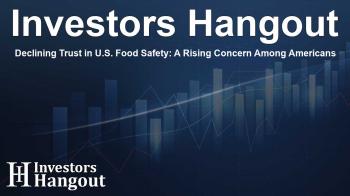Declining Trust in U.S. Food Safety: A Rising Concern Among Americans

American Perception of Food Safety: An Alarming Trend
In a recent survey, confidence among Americans regarding the safety of the U.S. food supply has taken a troubling downturn, reaching the lowest point observed in years. This shift, highlighted by the findings of the IFIC Food & Health Survey, raises important questions regarding public trust and safety standards in food production. The survey involved a diverse range of 3,000 individuals, offering a broad perspective on consumer sentiment towards food safety.
Historical Context of Food Safety Confidence
The statistics reveal a concerning decline: only 55% of Americans now express confidence in the safety of food products, a notable drop from previous years (62% in 2024 and 70% in 2023). The percentage of respondents indicating they are 'very confident' has plummeted to a mere 11%, down from 24% in 2022. This stark reduction in trust spans across various demographic groups, signifying a widespread concern about food safety.
Key Concerns Among Consumers
The data uncovers several prevalent issues affecting American consumers' perspectives on food safety:
- A sentiment that profit takes precedence over safety, cited by 59% of respondents.
- A belief that components of the food system do not collaborate effectively for safety, expressed by 54%.
- Concerns regarding inadequate government regulation, reported by 46% of participants.
- A rising unease over the frequency of food recalls, accounting for 43% of those surveyed.
Changing Perceptions of Food Safety Risks
This year, emerging concerns have shifted towards foodborne illnesses such as E. coli and Salmonella, with 50% of respondents placing it among their top priorities. This pivot indicates a significant change from last year when worries about cancer-causing chemicals in food topped the list. Following foodborne illness, other concerns include pesticide residues (46%) and the presence of heavy metals in food products (41%). The increase in worries about food additives, now reported by 36% of consumers, underscores a growing apprehension regarding food safety.
Imported Food Safety Views
Interestingly, consumer attitudes towards imported foods showcase a notable shift over the past decade. While 32% of Americans now consider imported foods to be less safe than domestic options—a decrease from 52% in 2014—views on healthfulness are varied. About 21% believe imported foods are less healthy, while 19% deem them healthier. The mix of opinions underlines an evolving dialogue about food production standards internationally.
Transparency as a Pathway to Rebuilding Trust
Despite the evident concerns, the survey indicates a potential path forward through transparency and better communication regarding food safety regulations. An encouraging 40% of Americans expressed that an improved understanding of governmental and corporate food safety measures would bolster their confidence. Furthermore, stricter regulatory practices could similarly enhance assurance among consumers.
A Call for Collaboration
Industry leaders, including Wendy Reinhardt Kapsak from IFIC, emphasize the necessity for collaborative efforts in rebuilding public trust. The call for credible, transparent communication aligns with an invitation to all sectors—industry, government, and academia—to work hand in hand to improve food safety standards and regain consumer confidence.
Looking Forward: Key Initiatives and How to Stay Informed
The insights gathered from the IFIC Food & Health Survey will unfold throughout the year, highlighting various topics aimed at enhancing public knowledge about food safety. Engaging discussions at platforms like the IAFP Annual Meeting will further contribute to the shared mission of raising standards and ensuring food safety.
As consumers, awareness remains essential. Knowledge about how companies and regulatory bodies are addressing these concerns can help shift perceptions and bolster confidence in the food system. For individuals seeking more information or ongoing updates about food safety trends, following reputable sources and participating in discussions will empower them to stay informed.
Frequently Asked Questions
What prompted the decline in confidence regarding food safety?
The decline in confidence stems from various concerns among consumers, including perceived prioritization of profit over safety, insufficient government regulations, and the frequency of food recalls.
Which food safety issues concern Americans the most?
Foodborne illnesses such as E. coli and Salmonella topped consumer safety concerns, followed closely by worries about pesticides and heavy metals in food products.
Have perceptions of imported food safety changed over time?
Yes, perceptions have improved, with fewer Americans believing imported foods are less safe compared to a decade ago, although opinions on healthfulness remain mixed.
What role does transparency play in rebuilding trust among consumers?
Transparency helps consumers feel more assured about food safety measures and regulations, thus potentially increasing their confidence in the food supply.
How can consumers stay informed about food safety issues?
Consumers can stay informed by following reputable organizations, engaging in discussions about food safety, and seeking information from ongoing research and surveys like those conducted by IFIC.
About The Author
Contact Lucas Young privately here. Or send an email with ATTN: Lucas Young as the subject to contact@investorshangout.com.
About Investors Hangout
Investors Hangout is a leading online stock forum for financial discussion and learning, offering a wide range of free tools and resources. It draws in traders of all levels, who exchange market knowledge, investigate trading tactics, and keep an eye on industry developments in real time. Featuring financial articles, stock message boards, quotes, charts, company profiles, and live news updates. Through cooperative learning and a wealth of informational resources, it helps users from novices creating their first portfolios to experts honing their techniques. Join Investors Hangout today: https://investorshangout.com/
The content of this article is based on factual, publicly available information and does not represent legal, financial, or investment advice. Investors Hangout does not offer financial advice, and the author is not a licensed financial advisor. Consult a qualified advisor before making any financial or investment decisions based on this article. This article should not be considered advice to purchase, sell, or hold any securities or other investments. If any of the material provided here is inaccurate, please contact us for corrections.

